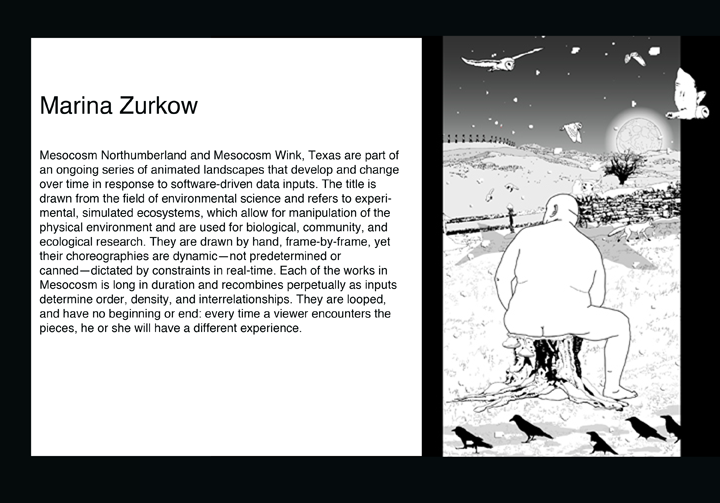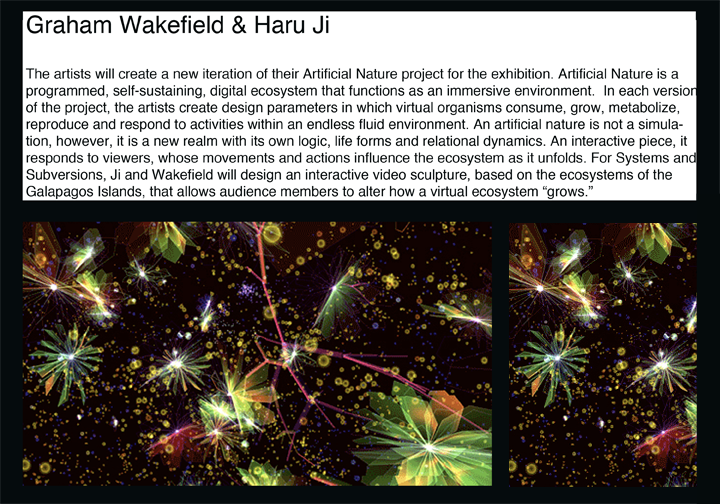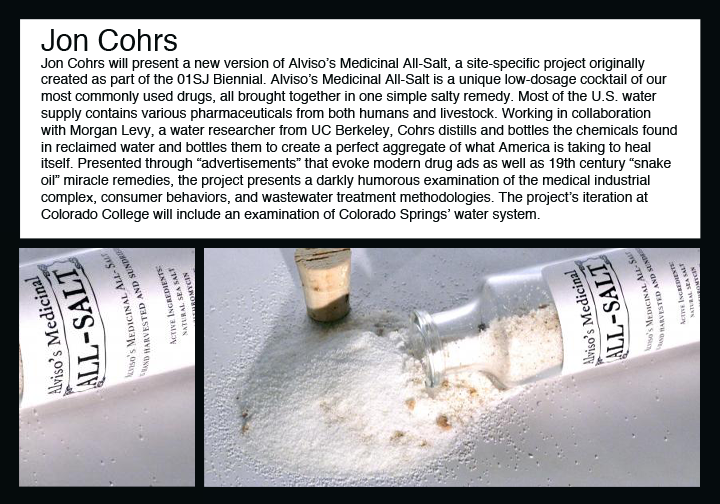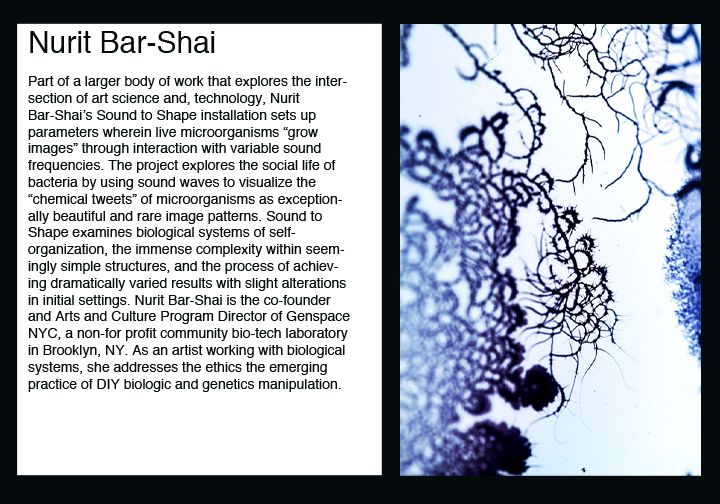Systems & Subversions
September 5 — November 5, 2013
The exhibition will feature several projects that create, examine, and/or disrupt natural and artificial systems. Featuring both high-tech, digital artworks and low-tech “DIY” inspired projects, the exhibition engages issues of audience co-creation of content, participation, and interactivity. Each piece in the exhibition either creates a system in which the audience may participate, uncovers hidden systems, or actively unravels (or hacks) pre-established systems to achieve other aims. Associated programming and events addressing issues of bio-hacking and bio-ethics and the “fair use” of DNA will complement the NSO/FYE book selection, The Immortal Life of Henrietta Lacks.
Sponsored by: The Colorado College Cultural Attractions Fund; The Andrew W. Mellon Foundation; and The Colorado College Art Department

Mesocosm Northumberland and Mesocosm Wink, Texas are part of an ongoing series of animated landscapes that develop and change over time in response to software-driven data inputs. The title is drawn from the field of environmental science and refers to experimental, simulated ecosystems, which allow for manipulation of the physical environment and are used for biological, community, and ecological research. They are drawn by hand, frame-by-frame, yet their choreographies are dynamic—not predetermined or canned—dictated by constraints in real-time. Each of the works in Mesocosm is long in duration and recombines perpetually as inputs determine order, density, and interrelationships. They are looped, and have no beginning or end: every time a viewer encounters the pieces, he or she will have a different experience.

The artists will create a new iteration of their Artificial Nature project for the exhibition. Artificial Nature is a programmed, self-sustaining, digital ecosystem that functions as an immersive environment. In each version of the project, the artists create design parameters in which virtual organisms consume, grow, metabolize, reproduce and respond to activities within an endless fluid environment. An artificial nature is not a simulation, however, it is a new realm with its own logic, life forms and relational dynamics. An interactive piece, it responds to viewers, whose movements and actions influence the ecosystem as it unfolds. For Systems and Subversions, Ji and Wakefield will design an interactive video sculpture, based on the ecosystems of the Galapagos Islands, that allows audience members to alter how a virtual ecosystem “grows.”

Jon Cohrs will present a new version of Alviso’s Medicinal All-Salt, a site-specific project originally created as part of the 01SJ Biennial. Alviso’s Medicinal All-Salt is a unique low-dosage cocktail of our most commonly used drugs, all brought together in one simple salty remedy. Most of the U.S. water supply contains various pharmaceuticals from both humans and livestock. Working in collaboration with Morgan Levy, a water researcher from UC Berkeley, Cohrs distills and bottles the chemicals found in reclaimed water and bottles them to create a perfect aggregate of what America is taking to heal itself. Presented through “advertisements” that evoke modern drug ads as well as 19th century “snake oil” miracle remedies, the project presents a darkly humorous examination of the medical industrial complex, consumer behaviors, and wastewater treatment methodologies. The project’s iteration at Colorado College will include an examination of Colorado Springs’ water system

Part of a larger body of work that explores the intersection of art science and, technology, Nurit Bar-Shai’s Sound to Shape installation sets up parameters wherein live microorganisms “grow images” through interaction with variable sound frequencies. The project explores the social life of bacteria by using sound waves to visualize the “chemical tweets” of microorganisms as exceptionally beautiful and rare image patterns. Sound to Shape examines biological systems of self-organization, the immense complexity within seemingly simple structures, and the process of achieving dramatically varied results with slight alterations in initial settings. Nurit Bar-Shai is the co-founder and Arts and Culture Program Director of Genspace NYC, a non-for profit community bio-tech laboratory in Brooklyn, NY. As an artist working with biological systems, she addresses the ethics the emerging practice of DIY biologic and genetics manipulation.

For the exhibition, Scott Johnson will develop a video and photography project that examines the interaction between human behaviors/systems of belief and natural systems such as weather patterns and hive ecologies.